#seven wonders of the ancient world
Text
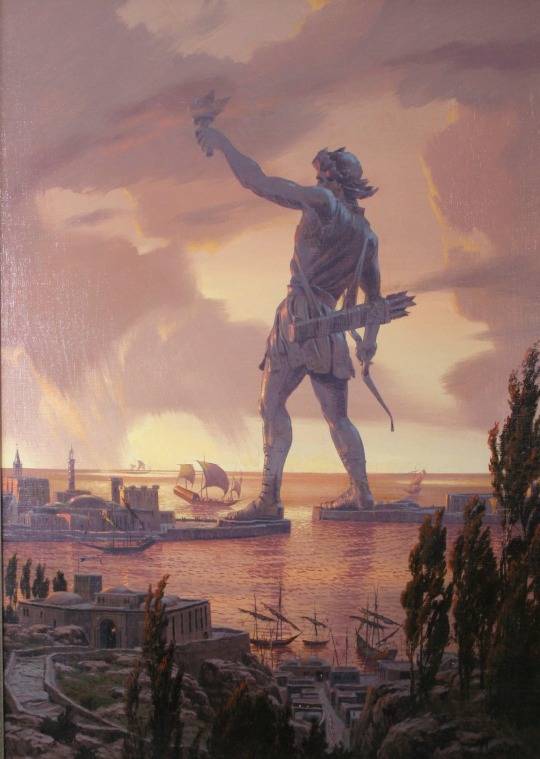
The Colossus of Rhodes
#colossus of rhodes#statue#art#greek#gods#helios#ancient world#ancient greek#ancient greece#greek mythology#history#europe#european#rhodes#mediterranean#seven wonders of the world#seven wonders of the ancient world#statues
717 notes
·
View notes
Text
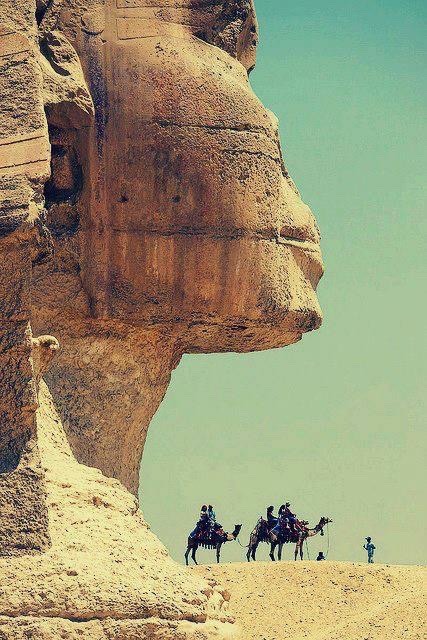
The Great Sphinx
Who Built the Sphinx? The Sphinx Temple Has the Answer by Mark Lehner
Many alternative thinkers claim the Sphinx is much, much older, that it existed thousands of years before Khufu. But our study of the Sphinx and the temple lying just below it—the Sphinx Temple—says no. As certain as we can be about such matters, Khafre created most of the Sphinx. However, Khufu might have started it.
The stone-by-stone map of the Sphinx Temple allowed us to investigate a telltale clue about who built the Sphinx. Quarrymen cut the core blocks (the ones forming the core of the temple walls) so thick—some weigh up to a hundred tons—that many of them include three geological layers. And it was clear that the layers in many blocks were the same as those that run through the bedrock of the Sphinx itself. The blocks had to have come from the U-shaped ditch around the Sphinx. When workers quarried the ditch they left a large block of limestone from which the Sphinx was carved.
As I moved about the Sphinx Temple during my first year of the mapping project, I was struck by how the geological layers run continuously in many places, from one block to another, as the layers must have run in the bedrock. The gangs of young men who moved these mighty stones did not have much chance of mixing them up from quarry to temple wall. The Sphinx and its temple must have been part of the same quarry-construction sequence. But could I prove this?
The following year I met Tom, who had the expertise needed to geologically “fingerprint” the blocks and trace them back to the quarry. Tom looked at the Giza Plateau less as an archaeological site and more as frozen sea floors, petrified, pancaked, and stacked into the bedrock layers from which the pyramid builders quarried blocks, created tombs, and carved the Sphinx.
These layers formed during the Eocene epoch—some 34 to 56 million years ago, as a great primordial sea retreated northward. Under its ebbing waters, a colossal bank of nummulites, unicellular plankton-like organisms, built up. A sandbar developed on the embankment, and in the more protected waters behind it, a shoal and coral reef grew. As the sea retreated to the north, the area behind the sand bank became a muddy lagoon, inhabited by burrowing bivalves and sea urchins. A regular sequence accumulated, which petrified as soft, yellow, marly layers interspersed with harder beds.
In carving the Sphinx directly from the natural rock, the ancient Egyptian quarrymen cut a cross-section through the principal geological layers of the southeastern slope of the Moqattam Formation. The hard layers of the shoal and reef, for example, make up the lowest layer in the Sphinx and its ditch.
Tom and I began our Sphinx Temple core block study by examining each layer, or bed, of the Sphinx. We gave each bed a number and marked them on photographs and on profiles of the Sphinx. The beds were easy to distinguish as they weathered differentially: harder beds protruded, softer beds receded. Also, the relative abundance of different fossils varied. Members I and II showed the greatest differences: I is a very hard gray reef formation, while the first bed of Member II, 2b, is one of the softest of the yellow marl-clay layers. Members II and III are distinct, but the boundary is not so clear as between I and II. Aigner, following an earlier geologist, set the boundary between Beds 7 and 8.
The massive fine-grained bedrock of Beds 8–9 made for good sculpting, with far more endurance than the soft-hard-soft sequence of Member II. This is why the 4th Dynasty builders reserved Member III for the more exposed head. Details like the eyebrows have survived wind, rain, and sand for 4,500 years.
But from which beds exactly did they cut the core blocks? Would this tell us where they were in fashioning the Sphinx at the time they built the Sphinx Temple? To answer these questions we logged each block. We recorded their lithic qualities and fossil content, and assigned each block to one of seven types, A through G.
Most of the Sphinx Temple core blocks are Type A and consist of three layers: upper and lower hard massive layers separated by the soft, yellow marl layer in the middle, which runs continuously through separate blocks over long stretches of temple wall. These blocks come from beds that correspond to the lower chest of the Sphinx.
Type C blocks come from beds that correspond to the Sphinx’s upper chest, top of the chest, and base of the neck. In the Sphinx Temple these blocks cluster near the front. The quarry workers hewed the blocks from layers that would become the lion’s upper chest and top of the back and then dragged them to the eastern front of the Sphinx Temple. As quarry workers cut deeper, to the middle and lower Sphinx chest level, haulers and builders composed most of the core walls of the temple.
Block types B and D did not come from the Sphinx ditch. They most closely match strata to the southwest, exposed in the quarry cut for the Khentkawes Monument. They are less frequent and more intermittent in the temple walls than the A and C blocks. This could indicate that the builders stockpiled these blocks and brought them into the walls whenever there was a hiatus in the quarrying, dragging, and placing of the A blocks from the Sphinx ditch.
Khafre’s workers started shaping the Sphinx as they built his valley temple. And they were probably still shaping the lower lion body, cutting it out of its surrounding ditch, as they made the Sphinx Temple, Khafre’s last major addition to his pyramid complex. But they did not finish. They left the Sphinx Temple incomplete, without its exterior granite casing.
#ancient egypt#kemet#kemetic#egypt#pharaonic#Great Sphinx of Giza#seven wonders of the ancient world#Khufu#Khafre
7 notes
·
View notes
Text

Climbing the pyramid of Cheops around 1900.
Khufu or Cheops was an ancient Egyptian monarch who was the second pharaoh of the Fourth Dynasty, in the first half of the Old Kingdom period (26th century BC).
He is generally accepted as having commissioned the Great Pyramid of Giza, one of the Seven Wonders of the Ancient World, but many other aspects of his reign are poorly documented.
#Egypt#Great Pyramid of Giza#Khufu#Cheops#pharaoh#Ancient Egypt#Fourth Dynasty#Seven Wonders of the Ancient World#1900s#20th century#vintage photos#photos#pyramid
27 notes
·
View notes
Text
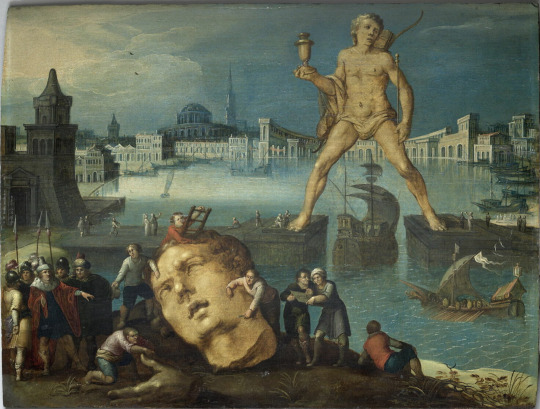
The Colossus of Rhodes
The Colossus of Rhodes was a statue of Helios, the Greek sun God, which stood over the Greek island city Rhodes. Notably known as one of the Seven Wonders of the Ancient World, the Colossus was erected by Chares of Lindos in c. 282 B.C.E. to celebrate the defeat of Demetrius I Poliorcetes, who had besieged the city for over a year.
Made of bronze, the statue was reported to stand at 70 cubits (105-110ft ; 32-33m) tall--about the same height as the Statue of Liberty, and acting as the tallest statue of the ancient world--and took almost twelve years to construct. Presiding over Mandrákion harbour, it is dated back to 1395 C.E. by the writings of an Italian who visited the island that the statue straddled the harbor (see painting above).
Tragically, around 227-225 B.C.E., an earthquake hit the island of Rhodes, snapping the Colossus at the knees. The collapsed statue was left untouched until 653-654 C.E. when *supposedly* Arabian forces, acting under Mu'awiya I, raided Rhodes. Pieces were said to be sold, totaling more than 900 camel loads.

Reconstruction
Ptolemy III offered to help pay towards the reconstruction of this statue, but the Oracle of Delphi made the people of Rhodes believe that Helios was offended, thus the offer met refusal.
Another reason for reconstruction being refused is due to the seismically unstable location Rhodes found itself belonging to. Having multiple devastating earthquakes cemented the unlikeliness that the statue could withstand existing if built again.
Misconception
The misconception towards the Colossus's stance, particularly from medieval interpretations, was disputed by simple explanations in John Lemprière's Bibliotheca Classica (Classical Dictionary). Lemprière states that construction would have blocked the harbor, and when the statue was finally built, builders would've needed to clean everything from the harbor in order to reopen. Additionally presented, when the Colossus met its dismay, it would have blocked the harbor and been left unseen on land (which we know isn't true considering many stories of Rhodes being a tourist destination just to see the fragments of Helios left scattered).
Furthermore, if you apply physics, you'd understand that the weight met with its legs-wide stance would crumple on its own.
The statue of Rhode's patron God is unknown by appearance besides that it may have curly hair and halo of spiked flame due to engravings on Rhodian coins which pictured Helios. The Colossus's pose is disputed, though historians believe Helios hovering his arm near his eyes to block light, attributing this possibility to a nearby temple's relief which shows the God performing the aforementioned action.

Credits
Beginning Piece:
"Le colosse de Rhodes"
by Louis de Caullery
Oil on Panel Painting, before 1622.
Louvre Museum.
Last Piece:
"Colosse de Rhodes"
by Sidney Barclay
Engraving, circa 1875.
Sources Used:
Art In Context
Britannica
Wikipedia (hey, they have good sources listed, I could've lied about what I read and put all of those here instead).
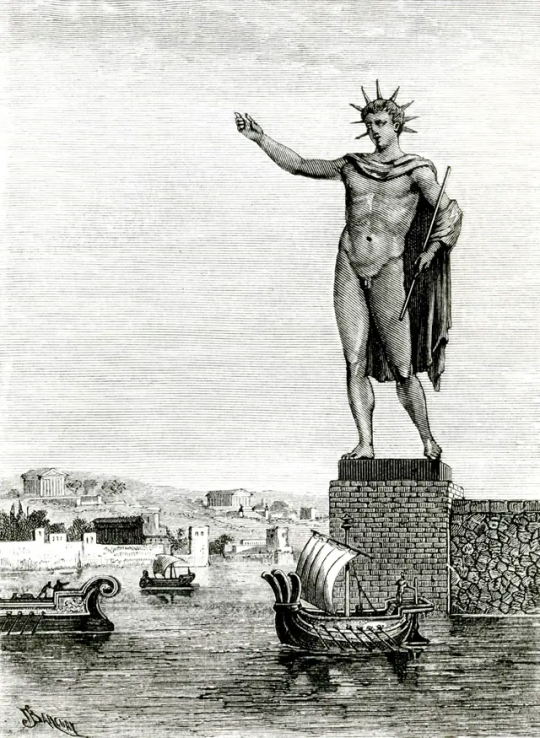
#seven wonders#seven wonders of the ancient world#ancient greece#ancient#colossus of rhodes#statue#scultpure#history#art history#painting#art#greece#rhodes#greek history#greek gods#helios
6 notes
·
View notes
Note
Sometimes i am in awe how most of the Seven wonders of the world were Greek. Like the Colossus of Rhodes, the Statue of Zeus, the Temple of Artemis etc. Like back then Ancient Greeks didn't shy away from creating enormous architecture.
Sadly only the pyramids survived :( and to think that i find it more appealing the ancient buildings, instead of Dubai's tallest building in the world. Why? First i am fascinated by history and how our ancestors did it, second our modern buildings look bland. Even a simple ancient column looks more pretty than a skyscraper to me, so i would like in the future architects create "wonders" like before.
Heh well the reason might be that the earliest found list of seven wonders was made by a Greek 😅 (Philon of Byzantium) in 250 BC. Of course I don’t mean that it’s not widely accepted that all of the monuments listed there must have been feats of engineering and architecture (let alone that the Alexandrian empire is where indeed most cultural hotspots of antiquity were located) but in theory, as a principle I believe perhaps more monuments would or should be included if it was an international list made with the engagement of representatives of all nations. Also, all the 7 wonder lists have been changing from time to time. The current one has no Greek monument inside 😢 but the ones it has of course also totally deserve it ❤️ That’s what happens when you try to fit the whole world in a seven bullet list. So, the ancient lists of seven wonders are certainly an interesting fact of history but I am not sure perpetuating them is relevant or has any usefulness.
Anyway the Giza Pyramid is IMO the honorary monument that should never leave the list and indeed it probably won’t, because it is by far the oldest still standing one.
But I agree about modern architecture being such a huge downgrade. Every big historical rhythm worldwide has been gorgeous or at least has clearly attempted to offer an aesthetically appealing image until the early 20th century when people just collectively decided to undo millennias of architectural innovative prosperity. However, I do find skyscrapers impressive but it’s because of their size obviously, not their beauty. Aside from the skyscrapers, I also mostly hate modern minimal architecture. Same with modern art. It is like people become too bored to use their brains and hands.
#seven wonders#seven wonders of the ancient world#history#philo of Byzantium#architecture#anon#mail#Greek facts
5 notes
·
View notes
Text
The Legacy of Pharaoh Khufu and the Great Pyramid of Giza
Khufu, also known as Cheops, holds a significant place in ancient Egyptian history as the second pharaoh of the Fourth Dynasty during the Old Kingdom period, around the 26th century BC. The legacy of Khufu reaches far beyond his lifetime, leaving an indelible mark on the landscape of Egypt and inspiring awe and wonder across the ages.
Successor to his father Sneferu, Khufu’s reign was marked by…
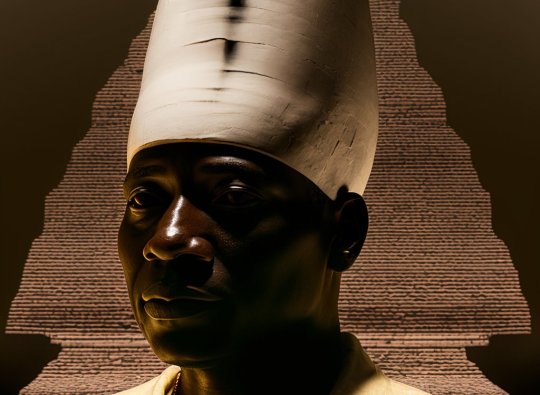
View On WordPress
#African History#Ancient Egyptians#ancient egyptians history#Cheops#Egyptian civilization#Great Pyramid of Giza#Khufu#Seven Wonders of the Ancient World
0 notes
Text
Time Travel Poll Winner Third Round Match Up 3:
These Questions are the winners from the previous iteration.
Please add new suggestions below, if you have them, for future consideration.
#Time Travel#The Hanging Gardens of Babylon#The Library of Alexandria#Ancient World#The Seven Wonders of the World
46 notes
·
View notes
Text
#classical art#history#7 wonders#the seven wonders of the ancient world#pyramid of giza#colossus of rhodes#alexandria#babylon#olympus#greek#roman#jude.poll
24 notes
·
View notes
Photo
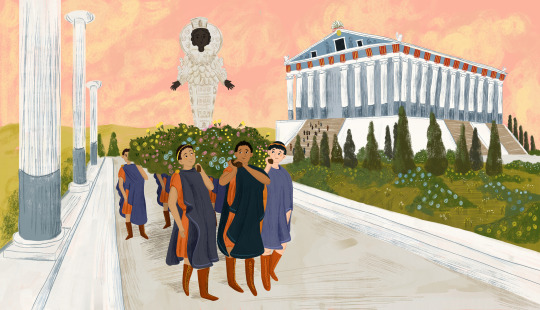
(EN) Did you know?🤔
There were at least five temples dedicated to the goddess Artemis in the city of Ephesus, all of which were considered architectural marvels in her time.
Watch this and more in our YouTube video:
"The Story of the Temple of Artemis".
Link: https://youtu.be/Gmre11I46dg
Art by Thorinds
(ES) ¿Sabías qué?🤔
Hubo al menos cinco templos dedicados a la diosa artemisa en la ciudad de Éfeso, todos fueron considerados maravillas de la arquitectura en su tiempo.
Mira esto y mas en nuestro video de YouTube:
"La historia del Templo de Artemisa".
Link: https://youtu.be/Gmre11I46dg
#history#historia#history art#temple of artemis#seven wonders of the world#artemis#artemision#ephesus#ancient greece#4th century bce#greek art#greek temple#turkish history#greek history
11 notes
·
View notes
Text
i miss that period of childhood when all you really had to do to entertain yourself was spend an afternoon reading a picture book about the seven wonders of the ancient world
8 notes
·
View notes
Text
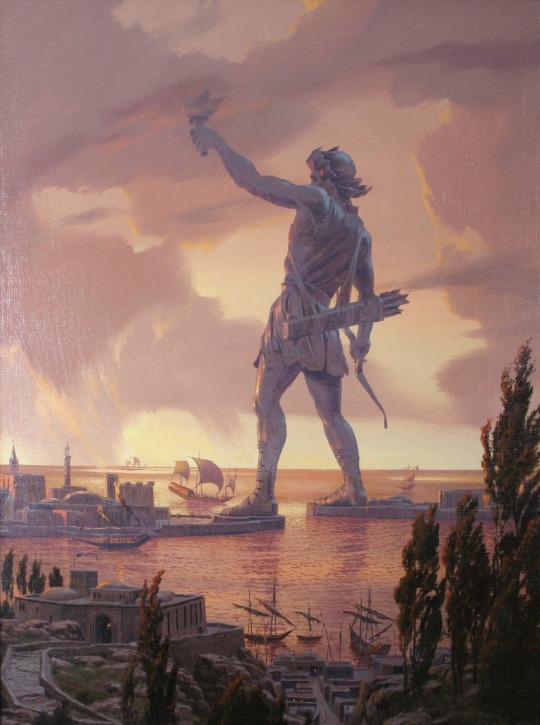
Colossus of Rhodes
#colossus of rhodes#statue#sun#god#helios#seven wonders of the ancient world#seven wonders#seven wonders of the world#ancient greek#ancient greece#greek#greece#rhodes#history#mythology#ancient greek mythology#greek mythology#architecture#art#europe#european#mediterranean
290 notes
·
View notes
Text

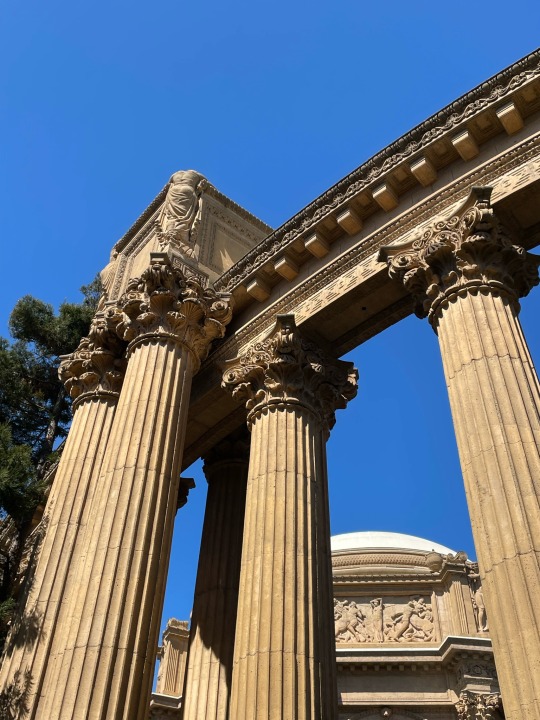
palace of fine arts, san francisco
#here for the weekend#this is the closest i'll ever get to seeing one of the seven wonders of the ancient world while living in the us#ok to rb
2 notes
·
View notes
Text
Petra, Jordan
#Petra#Petra Jordan#Jordan#7wondersoftheworld#seven wonders of the world#world wonders#ancient#ancient city#Moses#historical tourism#heritage tourism#geotourism#nabateans#archaeological site#worldfacts#travelfacts#travel#tourism
7 notes
·
View notes
Text
Paul's Seven Wonders of the Modern Word - The Taco
The first seven wonders were the Seven Wonders of the Ancient World*. They were called they were: seven of them, were wonders, and were around during the times of the ancient world. Presumably there were wonders around hundreds of millions of years ago. The world back then teemed with nothing more than the odd virus colony. Unfortunately, the ancient virus never left any written record. And if…

View On WordPress
#Colossus of Rhodes#finest ingredients#Great Pyramid of Giza#hanging gardens of Babylon#Lighthouse of Alexandria#Mausoleum of Halicarnassus#of the Ancient World#of the moder world#Paul De Lancey#seven wonders#statue of Zeus at Olympia#taco#temple of Artemis#virus#written record
0 notes
Text
OCTOBER WRAP UP | manga and a whole lot of once upon a time
Hey friends, welcome to or welcome back to my blog! In September all I did was watch Doctor Who and so I wanted to try and shake things up for October, but I wasn’t in much of a reading mood… But, I did manage to read 15 things so I’m counting it as a win! I don’t know when my slump will let me get back to finally reading actual books again but I’m looking forward to it! In the meantime, I am…

View On WordPress
#2023#2023 Wrap Ups#and My Crush Wants Me to Make a Love Potion Manga Series#Anne of Green Gables#Anne of Green Gables Manga Classics#Artemis Fowl#Cherry Magic! Thirty Years of Virginity Can Make You a Wizard?! Manga Series#Hi#I&039;m a Witch#Me and My Beast Boss Manga Series#Run on Your New Legs Manga Series#Sweat and Soap Manga Series#The Moon on a Rainy Night Manga Series#The Other World&039;s Books Depend on the Bean Counter Manga Series#The Raven Boys#The Raven Cycle#The Seven Ancient Wonders#Wrap Ups#Your Lie in April Manga Series
0 notes
Note
I know we're all focused on Satyr/Faun König but that bull comment... I'm quite partial to minotaur's and whats better than a darling who isn't from the area. Oh yes she's innocent of the crimes against König because she was not raised there.
Some foreign little creature just running blind in a maze trying to see where there might be a way out. It's been days after all and the screaming has gotten quieter and she wonders if she's the last one left alive. He takes his time eating his meals... this can be stretched out for such a long time as she hides herself in a dead end just a short rest... the darling is so tired unaware of the horrifyingly silent steps moving closer to her little haven. It's just her left now.
@kit-williams I've wanted to write for Minotaur!König for ages!
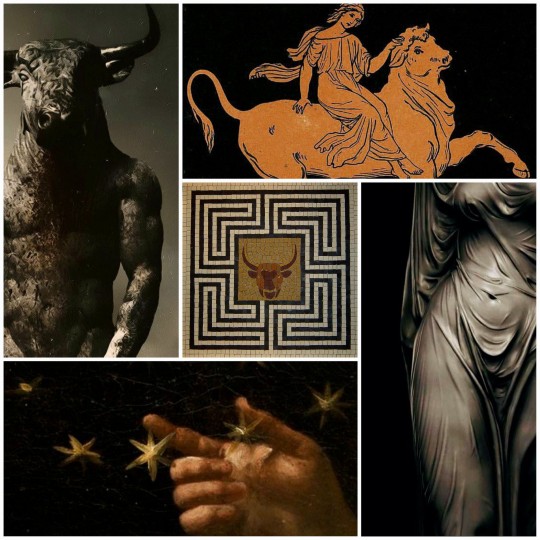
Minotaur!König x Ariadne!Reader
Word count: 5 k oneshot
Tags/warnings: Sexual tension, threats of violence and rape, implied cannibalism, power imbalance, moral ambiguity. Predator/prey dynamic, Beauty and the Beast elements, Ancient Greek religion & lore. 18+ MDNI
A/N: The Minotaur in this story is not an actual hybrid. Reader is Hecate’s initiate. Merry Christmas y'all! <3
EDIT: PART 2 HERE
The screams are the worst part.
They echo through the Labyrinth while you wait and wait and wait.
Even the very stones seem to cry and wail as you place your hope on Theseus who descended to this hell along with you and the human cattle. Seven young men and seven unwed women, meant to satisfy a beast...
And judging by the screams alone, it sounds like the monster is satisfied. It sounds like it's having a ball.
Fourteen lives have been lost, their blood swallowed by the earth as if Hades himself is drinking the crimson of Athenian youth in His feast. The flesh is the beast’s to devour: an underworld demon born of tainted lust.
Half bull, half man, you always thought the stories were only tales told by the fire to scare children. Turns out that the stories, for once, are true. There's something even worse in this maze, something cursed and foul... Hecate herself would shiver if She were here, in the womb of the earth, witnessing what you’re witnessing now.
You don’t actually see the Bull of Crete cut or hack or slash anyone, and you can only imagine what the monster does to the bloody, gutted corpses of the young. The only thing you see are the hollow, dark walls carved out of soil, sand, and clay, the intestine-like route dug deep into the earth. And you don't have to see the massacre: the screams tell you enough. The silence that follows betrays even more.
Your only light is flickering, waning: the candle will hardly last an hour. If the hero from Athens won’t arrive soon, you will have to leave this place.
And oh, how you want to leave… You were a fool to follow him here. Blinded by love and hope, you thought Theseus of Athens would be your way out of Crete, but it’s clear that the only thing the young hero is capable of loving is fame. The only time his eyes turned to yours was when you said you might be able to help him with a small bundle of yarn.
Red as the setting sun or spilling blood, the thin woollen string is your only way out now. It’s ironic how a heap of twine is the only thing that can help you out of this hellhole, but the Fates always did possess a cruel sense of humour. Your silly daydreams might’ve cost your life, and even if you’re sworn to the dark goddess, you would rather die anywhere but here. In the darkness, all alone, with nothing but eyeless worms to keep company to your decaying bones.
The sudden draft from the outside world is warm but threatens to blow out your candle. It’s a sign from Apollo: if you don’t leave now, you’re dead. Theseus has to manage without you because you’re not dying in this underworld prison because of some man’s stupid lust for fame.
There's only deafening silence in the maze as you scurry up, taking support from the wall as your sight darkens for a moment. You rose too soon: you can’t even remember the last time you ate. And it appears that even the sun god has abandoned you because there's a faint echo of steps in the tunnel, and they don’t belong to a man. They’re too thick, unduly heavy, and it’s not a pair of sandals that are thumping against the soil.
So, Theseus is dead...
So much for the legend, the myth, the demigod.
Heart thumping in your chest and in the hollow of your throat, it threatens to drown the sound of approaching footsteps. They’re all dead, the people who descended here with you. The only thing you are right now is prey. You're being hunted; whether the Minotaur knows you're here or not, you know you're being hunted. You can feel it in your gut.
You cover the candle with one hand, hoping that the flickering light doesn’t reach around the bend. The falling thump of the footsteps stops, and you still your breath, hoping that the beast would turn around and search the other way.
You hear it sniffing behind the wall. It's trying to catch your scent in the air, the smell of dread and terror, sweat so thick it must reach his nostrils and make them flare with lust. Your heart is thundering in your chest, and the tunnel is so quiet that that you’re certain the creature will hear that, too. (Your heart always betrays you.)
And your luck is cursed.
The beast shifts.
You can’t see him yet, but you can hear it: the scraping sound underneath his feet as he aligns himself anew, choosing the path that leads straight down to you.
“Hecate save me,” you whisper into the air that seems to grow denser as he approaches, loud thumps of feet now accompanied by metal grating against clay.
“Hear me, flame-bearing guide... Darkness, protect me…”
He’s dragging bronze against the wall, announcing that he’s carrying a weapon with him, the strength of a bull apparently not satisfying enough if he wants to break your bones with metal.
Don’t blow out the candle...
If you blow it out, you’ll die.
It’s a clear message, a knowing voice in your head that says it. It’s not young, it’s not old: just knowing. Alert. Wise beyond ages.
So you still your breath and wait.
Shadows fill the curve of the tunnel just before he emerges: thick like thunder, a darkness so deep that even the name of the twilight goddess escapes your tongue.
And he’s big. Bigger than the bulls you used to dance with, bigger than kings, or heroes, bigger than even Theseus, the man you thought was a myth walking. His head is enormous, bigger than the rest of him, awkward and rough like it’s not quite part of him even though he’s supposed to be half ox.
The gigantic, horned figure stops when it sees you. Vast shoulders tense; the fat, double-edged sword falls to his side when he settles to loom between you and your only way to escape this place. You’re oddly thankful that the horrible screeching stopped, but then you notice that his blade is drenched in blood: actually, his torso, thighs, even the buckskin loincloth – the only garment this monster has chosen to wear – is spattered with red dots.
The bronze tip drips with crimson, and the earth drinks it all. Hades is never satisfied: this beast is never full. Everyone who was sent down here is dead: everyone else has met their doom except you. You wonder if your mother would cry if she heard her only daughter died because she fell in love with a fool.
“I killed your hero,” the walls of hell boom.
His voice is thick like tar, dark and foul like it’s the God of Earth himself speaking.
The flame in your hand quivers from fear, and you slowly remove your palm, the tiny candle illuminating the beast with warm homely yellow, making the prominent muscles of his chest even bigger.
He’s carved like the statues in Athens, only, this giant is far hairier than the painted marble heroes of the city. The hair on his chest is thick and wild; it shoots down his abdomen and disappears underneath the loincloth, spreads over his inner thighs, even covers his shins in dark mats. He looks like a wild man, a beast indeed: sweaty, filthy and thick. But you never knew a beast like him could talk…
“A coward, that one,” he snarls, the voice reverberating oddly like it’s a human man speaking from under a wooden mask or inside a clay jug.
And you believe every word he says.
Theseus was strong and able-bodied, but he had built his strength just to show it off. This man’s body speaks of pure, ripe survival.
A hulking shadow with shoulders that barely fit the tunnels of the Labyrinth, with palms nearly twice the size of yours, he’s the myth walking instead of the hero whose blood now adorns that dull bronze blade. The Minotaur who survived his father’s wrath, his mother’s absence, these bleak surroundings, and all the heroes sent down to get his head… His weapon isn’t even sharp anymore, and still, he managed to cut through the sacrificial humans like butter. And what a horrific death it must’ve been to be hacked to pieces by a dull blade.
Is it evil of you to hope that the death of your “hero” wasn’t a quick one…?
Theseus was a fool and a coward, rotten to the core, but you saw all of that too late. He never cared about the human sacrifices or the king’s wrath; he never cared about digging into Pasiphae’s sorrow. He only cared about getting his face depicted on a pot or having his deeds played out in amphitheatres, his name uttered in song, accompanied by harp and flute.
“I know.”
Your voice gets sucked into the earth: it doesn’t echo from the walls like his. It’s thin, damp, and frail, just like everything else meant to walk under the sun instead of stand buried under the earth.
But the beast before you tilts its head a little. It’s curious.
Why would you say that?
Why don’t you cry from hearing the news...? Why don’t you howl out your hero’s name and beg the gods to heed your grief? Why don’t you run away from a monster?
The candlelight is puny and weak, but it’s bright enough to bring out the eyes of an animal. You draw breath in the dampness of the earth when you finally see it: the bull’s head is devoid of eyes, and yet, the beast still has them. Blue as the summer sky, stern as the death grip of winter just before spring.
There’s nothing but ripped shreds of skin where the eyes should be, and instead of looking at you from the sides, they’re greeting you from the front. The horns are sturdy, but otherwise, the colossal head is a bit skewed... Thick patches of fur sticking out as if it was years and years old, and then – you realize it’s not his head; it’s only an illusion.
There’s a man under there. A full, grown man who’s made himself a terrible helmet out of a bull’s carcass.
“You’re a man,” you say out loud, earning yourself another shift of the colossal head.
“...What?”
The muffled echo confirms it: he’s speaking from inside the bull, moving only slightly to get a better look at you.
“You’re not a monster. You’re just a man.”
His eyes are wild but intelligent; they pierce you from inside the inanimate shield. The large chest heaves, his ribs flare like sails as he draws air through what must be the foul stench of a long-dead animal.
He takes a step, and you shrink, almost dropping your candle and the roll of red yarn.
“You think talking will save you, female?”
He speaks like a man, walks like a man, but his moves are an animal’s. Shoulders slightly hunched like he’s a bull about to attack, you recognize the way his muscles quiver from the times when you used to do bull leaping. You don’t dance with Rhea’s oxen anymore: your tasks at Hecate’s temple are more suitable and less wild for a maiden your age. Back when you were younger and more agile, you used to jump from the back of one bull to the next, clouds of dust swirling around you as you showed your prowess to the priests.
But you can’t charm this ox by dancing. This one can’t be tricked or fooled: he will pierce you with those horns or his brazen sword if you take even a step.
“I can get you out of here,” you wet your lips, noticing that the blue eyes shoot straight to your mouth when you do that. “I know the way out.”
“What makes you think I want out,” he says, so tight and tense that you fear he’s either about to leap at your throat or plunge his sword into your chest.
And you should be concerned about your own safety, not about his sensibilities – if he even has such things – but hearing this beast man’s reply is like drinking bile.
Why would anyone want to stay here?
You don’t know if he eats human flesh; you don’t know if he had to in order to survive. Everyone knows why his father threw him down here, but no one knows he’s not half the things the people above say he is. And if half of it isn’t true, what other lies have been told about the Minotaur?
Even most prisoners see the sun, yet this man has been deprived of that, too. He’s been robbed of mother’s love, of father’s mercy, of friends and foes, of mentors and guides. He’s been robbed of life, of stars, of fires and summer skies, of women’s giggles, of fistfights with fellow men. Of songs and plays, of festivals and games, of bull dances, and maidens that leap…
“Have you ever been up there…? On the surface?”
You turn your voice into soft water on pebbles, a soothing pour of persuasion and goodwill. His pecs contract, strong abs under thin hair and body fat bunch like you’re about to hit him there. You take a step, and now it’s his turn to shun away. It’s only half an inch, but he actually moves away from you.
“I can take you there,” you offer gently. “Have you ever seen the sun…?”
It’s like talking to a starved predator, trying to entice them to follow you with a fresh steak in hand, hoping that the fanged mouth won’t take more than was promised if it decides to accept the offering.
And the beast accepts.
“As a boy,” he grunts, a tad more softly.
Those eyes are fixed on you, reminding you of horses when they’re slightly afraid. The glint of white and blue behind the carcass is fiercely alive, quite unlike the hollow, disinterested stare of the Athenian hero who was only interested in himself.
But this beast is interested. Oh, the Bull Man of Crete is wildly, fiercely curious about you.
“You’ll take me to the sun,” he repeats, an affirmation rather than a question.
“Yes. To the surface. I promise.”
He moves. Like an animal who learned long ago to drive others into the corner so that he wouldn’t get forced there himself, he’s primal, sensual in the way that oracles in a trance are sensual.
Approaching you in silence that’s almost eerie, the hairs at the nape of your neck stand on end by the time he’s only an arm’s length away. Why announce his coming earlier if he can move so quietly?
“You’ll lead me to my father.”
His gaze bores into you, and not even the warm draft from the tunnels can prevent you from shivering. He’s distrustful, and it’s no wonder. It must be odd that some girl with a candle and a bundle of yarn is suddenly waiting for him around the bend, and doesn’t even flee. He’s a behemoth, but he’s not stupid. A stupid man would not have been able to survive, let alone thrive in this place.
And why should he trust you? Who is he supposed to trust in this maze when every person he has seen has either run away from him or tried to kill him? His father will slaughter him if he ever escapes the Labyrinth, so what else is a priestess in his kingdom but a squealing mouse, trying to feed him lies and then guide him to the surface and into a forest of spears?
“No,” you shake your head slowly. “No, I promise I know the way. There will be no soldiers–”
You shut your mouth just before a huge palm closes around your throat.
Gods, but he moves fast when he wants to…
The candle and the yarn drop the instant his hand seizes your neck, strong fingers nearly meeting at the back as he squeezes your windpipe ever so slowly.
And he’s so close now. The carcass reeks of death, but the man underneath stinks of plain human sweat. His musk is a peculiar mix of blood, earth and soil, something both stale and invigorating, the thin sheen of sweat and dirt covering his muscles making him look like a common builder. It’s strange that the bull’s head hasn’t yet decayed in this place, that the man doesn’t reek of bodies and bones that must be scattered around like debris further down the tunnels.
Another thing that’s strange is that he doesn’t seem to want to simply silence you.
He also wants to touch you.
A wide thumb strokes the underside of your jaw as he studies you. It slides down the column of your throat, the blue eyes gleaming with fascination when you swallow against him.
He drinks in the sight of you: the lips that part with fear, the frail collarbones that breathe against the side of his palm. The promising crevice between your breasts, the enticing softness of your teats.
You can hear his breath grow heavy under ox skin and bone, the rugged, vicious helmet he has chosen to wear. What lies under, you can only imagine, wherein he has little left to the imagination when taking in the curve of your breasts, your nipples rising to peaks under the thin white linen only temple virgins use.
Seeing your reaction to his touch makes him growl -- he actually growls like an animal, a deep, low rumble of approval rising up his throat when he sees how different your body is from his. How supple and cushy it is, soft and plump like a peach, covered only barely as if to tease a best like him. You wonder if he ever took pleasure in the maidens sent here by the king… If he ever thrust the sword between his legs into their weak bodies before giving them the mercy of his actual blade. Would he even know what to do with a woman, having lived here for so long?
“Please,” you whisper, bringing his eyes back to yours, the ice in them now liquid sapphire of pure want.
Gods… You need to bring his attention back to your offer of help before he sees it more compelling to just stay here and play with his new, plump little mouse. Virgin or not, you wouldn’t survive a mating with this man.
“I swear on Hecate’s torch that it’s not a trap. You have my word: I’m a priestess soon to be.”
He’s entranced. Hypnotized by your lips. You lick them to confirm your fears true: the man grunts with pleasure, out of instinct, absentmindedly like an animal who reacts to the sight of a fat, meaty bone.
Oh, he might not know what to do with a woman… But he would try his best to find out.
“Priestess…?” He rasps.
“It’s a holy woman,” you explain. “I serve the Goddess of the Crossroads.”
He snorts, either because he’s not impressed or because he’s downright amused by your vocation. The eyes, warmer, more demanding now, are far from the eyes of a bewildered beast.
“Little female of the crossroads... You will take me to the king. And then, I will kill him.”
He puts weight into his words, tries to make you understand.
He wants you to guide him to his father.
To the King who claims his son is half bull, to the husband who claims his wife was adulterous with an ox. To the King who demands tribute as virgins so that he can send them down to hell. The dark goddess screams justice, but you're at a horrible stalemate.
The gods will curse you for this… They will smite you with a bolt of lightning or drown you next time you cross the great sea if they see you’ve helped this half-beast escape. If you guide him to Minos, you’re a participant in kingslaying, and the gods never forget things like that.
“He’s your father and the king of Crete,” you whisper in fear. “The gods will strike you down–”
“Gods?” He spits. “I piss on the gods. I fuck their corpses and leave them to rot.”
You almost choke on the blasphemy levelled at you. The shadows creep closer, the stare behind the black fur is dark and amused, burning with the crooked wrath of a thousand years.
“Perhaps I’ll fuck you too.”
It’s unnerving that you don’t find the threat wholly unappealing.
If anything, your eyes drift down to the hairs of his chest, to the two big muscles that resemble the work of the best sculptors in Athens.
“Are you a virgin, female of the crossroads?”
His eyes search for your response: they want to see your fear and disgust. You swallow again, arduously against his hand, both caressing and testing you.
The beast leans forward, as if weighing if he could somehow insult the gods by pillaging you. The rough hair of his chest meets the white cloth, it brushes against your nipples as he bends down to have a good sniff of you.
“You smell like a virgin,” he growls.
The hand leaves your throat, only to travel down your sternum. He grabs your breast nonchalantly, a little too roughly, the hot palm closing around the teat and squeezing it like it’s a toy. When you don’t react, he squeezes it again, this time hard enough to coax a whimper out of you.
“Sound like a virgin…”
Without warning, the hand dives straight between your legs next, palm forcing its way through your thighs and curving to cup your sex, moulding around it with barbaric thirst.
“Feel like a virgin, too.”
It’s thick, hot, and heavy, how he simply tries you through your dress. Fingers testing your folds, he’s clearly enjoying the subtle wetness he finds down there. You can hear another hitched grunt pushing up his throat, rugged and whiny this time, a broken groan that dissipates because of how dry his throat is.
No man has ever dared to lay his hands on you... Many have wanted, but none have tried. Even drunkards and fools respect women who belong to the dark goddess.
But he doesn’t care about the wrath of Hecate. He doesn’t give a shit about the gods. He simply takes what he wants, what falls into his lap. The fifteenth offering, but he doesn’t seem to be interested in devouring your flesh.
How easily he could simply yank that loincloth aside and drag your dress up. Force his cock into your tight, wet heat without uttering a word. You doubt that he would even take the trouble of laying you down on the ground for taking... Beasts rut when they want to: this man could fuck you against this wall if his loins demanded so, guttural groans being the last thing you hear before the candle goes out.
You don’t know if you have to spread your legs for him before this is over, but you reckon you will do even that if it means you’ll see the sun again. You’ll endure every thick thrust, and gods be cursed, you wouldn’t even be solely disgusted if this half-animal chose to breed you... As shameful as it is, you would somewhat enjoy having him rut you like an animal in heat.
And you’ve gone mad, surely.
You want to touch him too, just to test another theory.
Deciding that it's a good idea to stick your hand into the maw of hell, your fingers lift. They meet his bicep, and the lewd panting stops.
He’s not even breathing… He’s just drowsy and drunk, looking at you with a mixture of soft sleepiness and awe in his stare. Like a dog who has never been petted, even his eyes drift half closed when he forgets to threaten you, now focusing solely on your hand.
And you start to caress him, slowly, so slowly… Tracing the muscle all the way up where it meets the shoulder, you stroke even the thick cord that leads to his neck. The rest of him disappears under the bull, but the man behind it already shivers under your touch. He even bends his head a little in hopes that you would go under the mask and touch him there, and the gesture reminds you of an animal exposing its vulnerable areas, baring its very throat in submission.
Braving a quick peek down, you notice that the buckskin cloth is stretched high and wide. His whole body is tense and immobile: you could cup him through the soft animal skin and he would probably shoot his seed from a single stroke of your palm.
If this is not a virgin, you don’t know what is...
In a way, it would perhaps be wise to shove your hand down and disarm this man. That way, you would be safe for a few more minutes. Instead, you lay your palm over his chest, right over where his heart should be.
“So do you, Bull of Crete...”
His gaze flickers.
The darkness hesitates, widens, nearly swallows the azure pools whole. But he doesn’t look irate or wild... Only shocked.
It’s an impasse. A thicket. His hand on you, your hand on him.
He surrenders first: the underworld budges before the utterly pure. You bless him with grace the instant he withdraws his hand from between your legs – slowly, reluctantly, like leaving a place that belongs to him. Or to which he belongs…
“I promise I’ll help you, Minos Tauros. But I need you to give me something in return.”
You remove your hand too. Softly, slowly, like a horse master who trains and tames wild things. All words seem to have escaped his tongue: he only grunts, unsure of what a beast like him could give you in return for your help.
“You must promise to be kind to me.”
“Kind...?”
“I need you to behave,” you explain. “No bad things on the way up... No fucking.”
Everything else, he seems to accept, but during the last sentence the Minotaur blinks at you, utterly confused.
“But... You smell like you want to fuck.”
Your jaw drops open a tiny bit. Then you remember that a priestess of Hecate doesn’t gawk.
“I don’t–How would you know that…?”
The beast only shrugs. Then he leans forward and takes another sniff as if to prove it’s true that you want his cock inside you.
“You smell good,” he grunts. “Different... Female, not afraid.”
“That doesn’t mean I want to…”
He even raises his hand to inspect the slight wetness there. Fascinated by the thin film on his fingers, he rubs his thumb in it, probably thinking about bringing it under his mask to get a good sniff of your juices too.
You grab his wrist without thinking, mortified to your core by the prospect of him getting high on your slick.
“Look. We need to leave before the candle burns out.”
The obsessive stare threatens to swallow you once more, so you let go of his wrist and steel your resolve. Scooting down to grab your things, you try to ignore the violent erection still pointing straight at you.
Hecate keep you from offering yourself to this man out of your own free will...
And you don’t have a torch, only a candle and a skein of blood-red yarn, but you know the way out, so there’s hope. There’s always hope.
“I need you to promise me,” you turn at the mouth of the tunnel, seeing that he’s still standing there, in the place where he almost took you like his first whore. As if waking up from a thrall, he straightens to his full height, picks up his sword and looks like a half-human, half-bull once more.
“I promise,” comes a booming voice from under the animal skull. “No fucking… I’ll behave.”
You nod. There's a sense of trust in the air. A promise of hope... It's mutual, invigorating -- life-giving, like the sun and blood in your hands.
You don't know if the son of Minos has ever smiled in here, but from the quick glint in his eyes, you suspect that he's smiling right now, the man under that animal mask. Somehow, it reminds you of the stars in the sky.
“Lead the way, maiden.”
3K notes
·
View notes